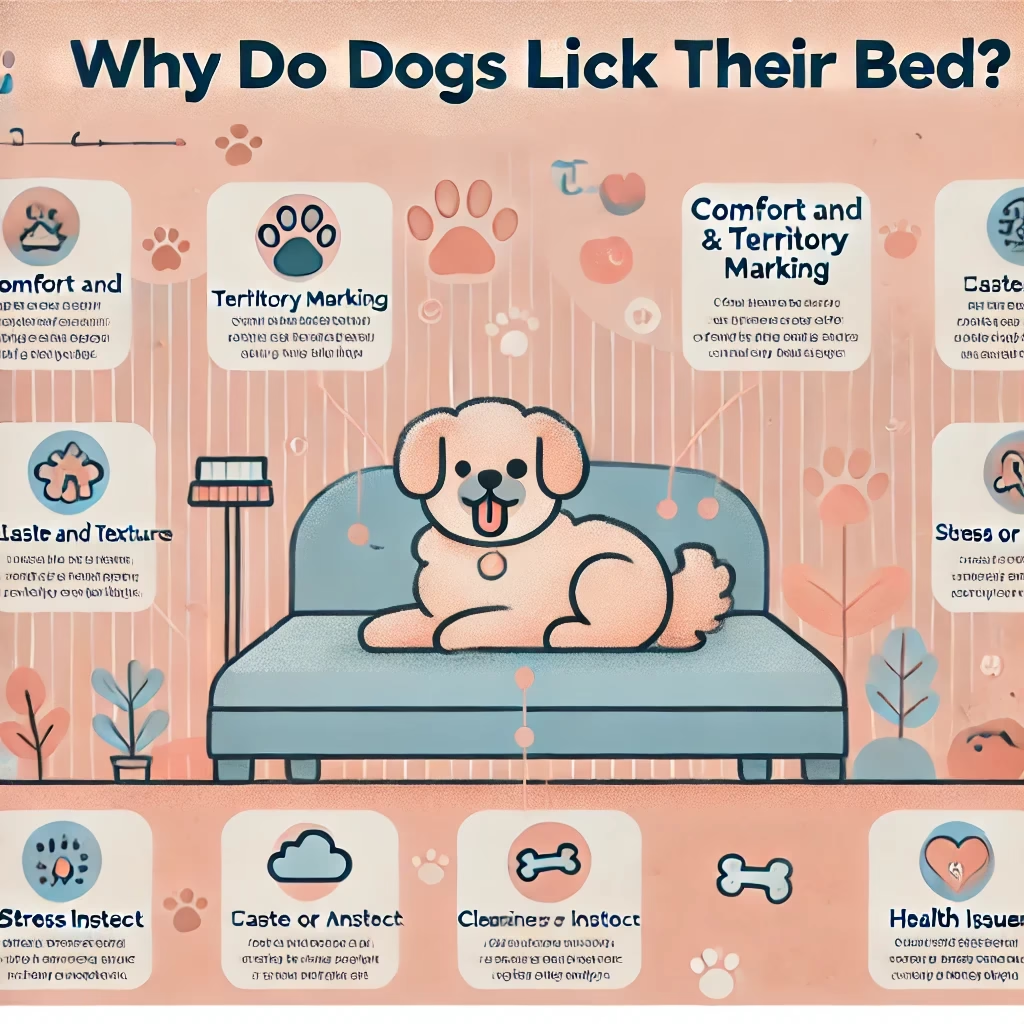Table of Contents
1. Introduction
Dogs are charming creatures with a wide range of behaviors, and one that often catches the attention of pet owners is when dogs lick their bed. This behavior, while apparently odd to humans, is quite common among canines. Understanding why dogs engage in this behavior is important, as it can provide insights into their physical and emotional well-being.
Licking is a natural behavior for dogs, and it can serve various purposes, from self-soothing to communication. When it comes to licking their bed, dogs may do so for reasons ranging from stress relief to underlying medical issues. This article will explore the possible reasons behind this behavior, offering expert answers and insights to help dog owners better understand their furry friends.
Rest assured, if your dog is licking their bed, it’s not essentially a cause for alarm. Many dogs exhibit this behavior at some point in their lives. However, if the licking becomes excessive or obsessive, it may be worth investigating further. Let’s dive into the details to uncover what might be behind this intriguing canine habit.

2. Common Reasons Dogs Lick Their Bedding
1. Instinctive Behavior
One of the reasons dogs repeatedly lick their bed could simply be because it’s their personal space. Similar to how animals mark One of the primary reasons dogs lick their bedding is tied to their wild ancestors. In the wild, dogs and their relatives would lick their sleeping areas as part of their nesting instincts. This behavior helped them create a comfortable and safe space to rest.
Licking also serves as a self-soothing action. Just like humans might play or bite their nails when anxious, dogs often lick to calm themselves. This behavior releases endorphins, which can help them feel more relaxed and secure.
2. Scent Marking
Dogs have a highly developed sense of smell, and licking is one way they spread their scent. By licking their bedding, dogs mark it as their own, creating a familiar and comforting environment. This scent marking behavior is especially common in multi-pet households, where dogs may feel the need to establish their territory.
This act of marking their bed can also help them feel more secure in their dog’s environment, reducing feelings of stress or anxiety.
3. Exploration and Curiosity
Dogs are naturally curious creatures, and they often use their mouths to explore the world around them. Bedding, with its unique touches and smells, can be particularly fascinating. A dog may lick their bed simply because they find it interesting or enjoyable.
This behavior is especially common in puppies, who are still learning about their surroundings. However, even older dogs, such as a 4-year-old or 3-year-old, may engage in this tentative licking from time to time.
4. Emotional Reasons
Licking can also be a sign of emotional distress. Dogs experiencing stress or anxiety may turn to licking as a way to cope with stress. This behavior can become excessive or obsessive if the underlying emotional issues are not addressed.
For example, a dog that is constantly licking their bed may be trying to soothe themselves during a stressful situation, such as a change in their environment or routine. In some cases, this behavior may be linked to underlying medical conditions, such as dental issues or skin irritations, which can cause discomfort and lead to excessive licking.
5. Boredom
A lack of mental and physical stimulation can lead to dull behaviors, including licking. Dogs that are bored may lick their bedding simply because they have nothing else to do.
To identify boredom-related licking, look for other signs of restlessness, such as pacing or critical behavior. Providing your dog with more exercise, interactive toys, or dog training activities can help reduce this behavior.
3. Potential Health-Related Causes
Skin Allergies or Irritations
One common health-related cause of excessive licking is skin irritations or allergies. Dogs can develop allergies to various environmental factors, including the materials in their bedding or the cleaning products used to wash it. If your dog’s bedding is made of synthetic fabrics or treated with harsh chemicals, it could trigger an allergic reaction, leading to licking behavior as a way to soothe the irritation.
If you notice your dog licking their bed more than usual, check for signs of redness, rashes, or hot spots on their skin. Consulting a veterinarian can help identify the cause of the allergies and recommend appropriate treatments or changes to your dog’s environment.
Gastrointestinal Issues
Another potential cause of licking is gastrointestinal discomfort. Dogs experiencing nausea or stomach issues may lick their bedding as a way to self-soothe. This behavior is often accompanied by other signs of digestive problems, such as vomiting, diarrhea, or loss of appetite.
In some cases, gastrointestinal issues like pancreatitis can lead to excessive licking. If you suspect your dog’s licking is related to stomach problems, a visit to the vet is essential to rule out serious conditions and provide proper care.
Dental or Oral Problems
Dogs with dental issues, such as tooth decay, gum disease, or oral pain, may lick their bedding excessively as a response to discomfort. The act of licking can sometimes provide temporary relief from the pain, but it’s not a solution to the underlying problem.
If your dog is obsessively licking their bed and you notice bad breath, drooling, or difficulty eating, it’s important to have their oral health checked by a veterinary professional. Addressing dental problems early can prevent further problems and improve your dog’s quality of life.
Nutritional Deficiencies
In some cases, excessive licking may be linked to nutritional deficiencies. Dogs with unbalanced diets or specific cravings may engage in pica, a condition where they lick or chew on non-food items, including bedding. This behavior can be a sign that your dog is lacking essential nutrients in their diet.
Consulting a dog nutrition expert or your veterinarian can help you determine if your dog’s diet needs adjustment. Providing a well-balanced diet tailored to your dog’s needs can often reduce or eliminate this behavior.
Compulsive Behavior Disorder
When licking becomes excessive and repetitive, it may be a sign of compulsive behaviordisorder, a condition similar to obsessive-compulsive disorder (OCD) in humans. Dogs with this condition may lick their bedding obsessively, even to the point of creating huge wet spots or damaging the fabric.
Compulsive licking can be triggered by chronic stress, anxiety, or boredom. In some cases, it may also have a genetic component. If you suspect your dog is suffering from a compulsive behavior disorder, it’s important to seek help from a veterinary dog behavior specialist or a dog trainer-behaviorist. They can recommend behavioral therapy, environmental changes, or even medication to help manage the condition.
4. How to Address the Behavior
Assess the Environment
Start by evaluating your dog’s dog bed and bed sheets. Ensure the bedding is clean and free from irritants that could cause skin irritations or allergic reactions. Use hypoallergenic detergents and avoid harsh chemicals when washing the bedding.
Rotating or replacing bedding regularly can also help. If your dog’s bed is old or worn out, it may be time to invest in a new one. A fresh, comfortable bed can make a big difference in reducing licking behavior.
Provide Mental and Physical Stimulation
Boredom is a common cause of repetitive behaviors like licking. To keep your dog engaged, provide plenty of mental and physical stimulation. Interactive toys, regular walks, and playtime can help channel your dog’s energy in a positive way.
For puppies and younger dogs, such as a 3-year-old or 4-year-old, consider incorporating dog training instructions or activities that challenge their minds. This can help prevent boredom-related licking and keep them entertained.
Address Anxiety or Stress
If your dog’s licking is linked to stress or anxiety, it’s important to address the underlying emotional issues. Calming aids, such as pheromone diffusers or anxiety wraps, can help soothe your dog. For severe cases, consult a veterinarian or dog trainer-behaviorist for professional guidance.
Creating a calm and secure dog’s environment can also reduce anxiety. Ensure your dog has a quiet space to retreat to and avoid sudden changes in their routine.
Regular Vet Check-ups
Regular visits to the vet are essential to rule out underlying medical conditions that could be causing the licking. Conditions like dentalissues, pancreatitis, or skin irritations may require medical treatment. A veterinary professional can provide a thorough examination and recommend appropriate care.
Train and Redirect Behavior
Training can be an effective way to address excessive licking. Use positive reinforcementtechniques to reward your dog for not licking their bed. Offer alternative items to lick or chew, such as safe toys or chew treats.
If your dog starts licking their bed, gently redirect their attention to a toy or activity. Over time, this can help break the habit and cheer healthier behaviors.
5. When to Be Concerned
Signs of Excessive Licking or Damage to Bedding
If your dog is constantly licking their bed to the point of creating huge wet spots or damaging the fabric, it’s a sign that the behavior has become excessive. This could specify a deeper issue, such as compulsive behavior disorder or a medical condition.
Presence of Other Symptoms
Pay attention to other symptoms that may accompany the licking, such as vomiting, lethargy, sores, or changes in appetite. These could be signs of underlying medical issues, including gastrointestinal problems or dental issues.
When to Consult a Veterinarian or Behaviorist
If your dog’s licking continues despite your efforts to address it, or if you notice any concerning symptoms, it’s time to consult a veterinarian or dog behavior specialist. They can help identify the root cause of the behavior and recommend suitable treatments or interventions.
For dogs with severe anxiety or compulsive behaviors, a veterinary dog behavior expert or professional dog trainer may be needed to develop a tailored plan for managing the issue.
6. Conclusion
Dogs licking their bedding is a behavior that can stem from a variety of reasons, ranging from natural instincts to underlying health issues. Whether it’s due to self-soothing, scentmarking, exploration, stress or anxiety, or even boredom, understanding the root cause is key to addressing the behavior effectively.
It’s important for pet owners to observe their dog’s behavior closely. While rare licking is normal and often harmless, excessive or obsessive licking could indicate a deeper problem, such as compulsive behavior disorder, dental issues, or skin irritations. Paying attention to other symptoms, like vomiting, lethargy, or changes in appetite, can also provide valuable clues about your dog’s health.
Related Posts
“Do Dogs Say Goodbye When They Pass Away? 7 Heartfelt Signs”
7 Alarming Reasons Your Dog Is Shaking and Not Eating
